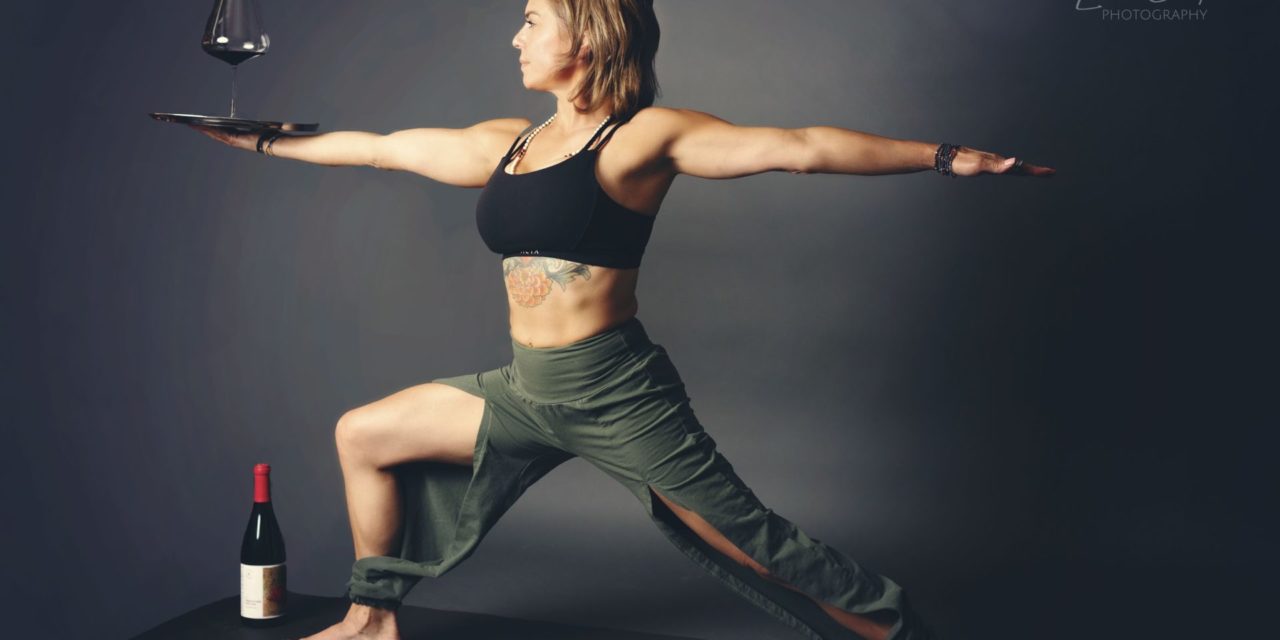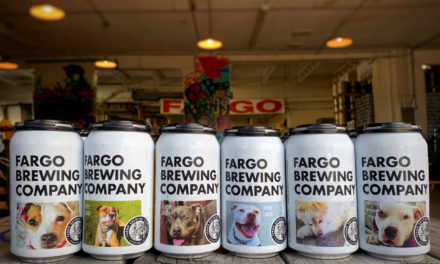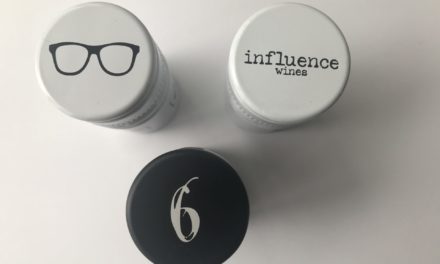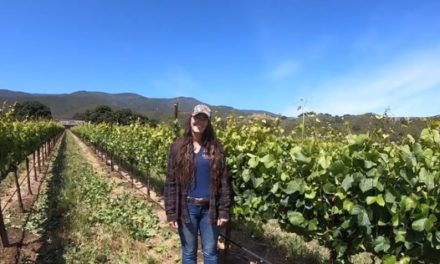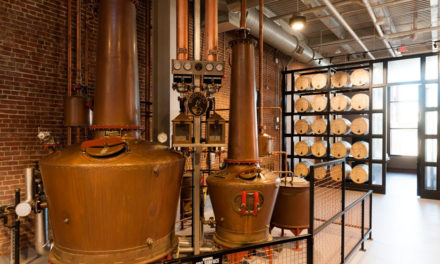The world needs to take a deep breath. Make it a double for folks in the hospitality industry.
The pandemic, coupled with the economic recession it caused, has created extreme stress and anxiety for everyone. About 53 percent of U.S. adults reported anxiety and stress in July, compared to 32 percent in March, according to a poll conducted by the nonprofit Kaiser Family Foundation. And the election hasn’t done anything to soothe anyone’s nerves.
Superimposed on the general chaos, there’s an economic and spiritual reckoning happening in the wine world.
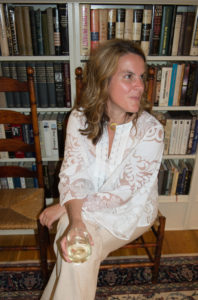
“There’s so much pressure to do things quickly, even tasting and analyzing wine. Too often, that means they’re not done well.” —Cathy Huyghe, Enolytics
First, let’s talk economics. Like restaurants and retailers, wineries have had to revamp their distribution and marketing plans during the pandemic. The foot traffic small-scale producers depend on has all but disappeared, while major events (and even small-scale tastings) are simply not happening. Then came the fires, which ripped through West Coast wine regions, destroying iconic wineries and much of the 2020 vintage, incinerating more than 8.5 million acres. Untold billions have been lost and, while it’s impossible to tally the impact, the estimate for restaurants alone tops $240 billion. Plus, about 40 percent of the hospitality sector is unemployed due to COVID.
Now, the spiritual. The wine business is being called on to reckon with its past failures. The Black Lives Matter and the #MeToo movements have inspired a call to action from Black, Latinx, LGBTQ, women, and nonbinary people who have shared horrifying stories, often confirmed by multiple witnesses, of racism, exclusion, harassment and, in some cases, rape, committed by powerful gatekeepers in the industry.
Despite some pundits’ most earnest attempts, there’s no way to positively spin 2020. But, some are quietly asking, is this also an opportunity to change the way we live our lives for the better, in large and small ways?
Take the way we taste and talk about wine. For years, there has been a quiet, but persistent, call to rethink the way we go about evaluating wine and communicating the findings to the public. While the institutionalization of wine tasting seems set in stone, the first formal wine tasting school was only established in 1969 with WSET. The Court of Masters Sommeliers wasn’t established until 1977.
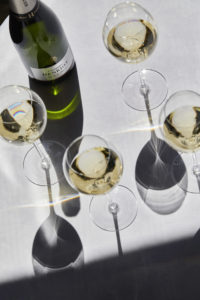
MediTasting set-up [Photo by Nicolas Demoulin]
Wine tasting, at its most basic, is a sensory analysis of wine. For many in the industry, though, it’s become a technical exercise that’s divorced from pleasure and appreciation—and, perhaps, a deeper understanding of what’s in the glass.
“There’s so much pressure to do things quickly, even tasting and analyzing wine. Too often, that means they’re not done well,” says Cathy Huyghe, co-founder of Enolytics, a business intelligence firm for the wine, beer, and spirits industry. “For years, I’ve been using Kevin Zraly’s method of wine tasting, which basically means taking a sip and holding it in your mouth for 5 seconds before swallowing it. Then, don’t say anything for 30 seconds and pay attention to how your body reacts. That doesn’t sound like a lot of time, but we very rarely give ourselves even that.”
Observing a moment of quiet with the wine increased Huyghe’s confidence and pleasure by “leaps and bounds,” she says, adding it’s also allowed her to nourish a healthier relationship with wine by deepening her awareness and appreciation of how a wine is grown and produced. Huyghe teamed up with Rebecca Hopkins in March 2018, when Hopkins launched A Balanced Glass, an online destination with the mission of providing education and resources to industry colleagues who want a more mindful relationship with alcohol. ABG creates a community that gives people the knowledge, tools, and resources—including meditation and yoga tutorials to manage their wellness.
‘Emotions Influence Perception’
Huyghe has been practicing yoga for 25 years and has been meditating for eight. She argues that bringing mindful practices into our study and enjoyment of wine can deepen and improve our relationship with it, especially now.
“I’ve never seen levels of anxiety and despair as high as they are right now and, as people who work in this business, it’s paramount that we drink alcohol in a healthy way and encourage wine lovers to connect with alcohol in a healthy way as well,” she says.
That means delving beyond the superficial structural analysis of a wine’s sugar, intensity, acidity, tannin, body and alcohol.
Huyghe recently co-hosted a Zoom Medi-Tasting with Dr. Elisha Goldstein, founder of the Mindful Living Collective in Los Angeles, Calif.; and Champagne Henriot, one of the last remaining family owned Champagne houses, which was founded in Reims in 1808. In a Medi-Tasting, participants are encouraged to stop and center themselves, breathe deeply, observe their body and emotions, then take an intentional sip.
A few years ago, Champagne Henriot approached Dr. Goldstein, to create an “intentional tasting experience,” with the goal of eliminating stress and breaking tasting habits to get wine lovers in touch with every element of the Champagne. Since the pandemic, perhaps predictably, interest in the Medi-Tasting by members of the industry and wine lovers has “exploded,” he says.

“Emotions influence our perception, and by reducing stress with our meditative approach, we improve our ability to taste the wine.” —Dr. Elisha Goldstein, Mindful Living Collective
“Emotions influence our perception, and by reducing stress with our meditative approach, we improve our ability to taste the wine,” Goldstein explains. “During the pandemic, especially, our nervous systems are on overdrive, which means that our brains are constantly engaging the narrative network, where we ruminate on the past and worry about the future. It’s inversely correlated with our ability to focus and pay attention, and appreciate the here and now.”
Indeed, multiple studies have demonstrated the benefits of mindfulness when combating mental and emotional challenges—even physical pain. Meditation has also been shown to combat addiction.
Observe, Listen, Visualize
“Mindfulness generally—and meditation, specifically—lets us regain control of our minds and influences our emotional states, instead of having our emotional states influence us,” says Goldstein.
Medi-Tasting makes the technical aspects of wine analysis secondary to the pure aesthetic appreciation of what’s in the glass. As the experience proceeds, instead of rigorously analyzing the wine—studying the appearance for clarity, intensity, color, then noting the nose’s condition, intensity, characteristics, development, and so forth—participants are encouraged to simply observe their Champagne, feel the weight and temperature of the glass, listen to the bubbles, appreciate and visualize every step that leads from a grape budding on a vine to the liquid in the glass. Of course, smelling and tasting are still part of it but, taken out of the lab-like context and approach so many of us—even enthusiastic consumers—have been steeped in, is a revelation. It provides, Goldstein attests, new layers of perspective, appreciation, and regard for this miracle of land and hand.
Kat Thomas, a sommelier and training manager at the global restaurant and nightlife brand Hakkasan Group (until the pandemic), had “been aware and observing [mindfulness] for years, but I truly began mindful practice in the last couple. I didn’t acknowledge for a while that being mindful takes practice.”
After losing her job and observing the anxiety she was experiencing, and seeing the same emotions among many of her peers, she launched CORE Body|Mind, a consulting platform and support network that guides members of the wine industry and the public through experiences that, like Henriot’s Medi-Tastings, focus on wine appreciation, with a heavy dose of mindfulness.

“Bringing mindfulness to the experience of enjoying wine is like a toast.” —Kat Thomas, CORE Body|Mind
“Bringing mindfulness to the experience of enjoying wine is like a toast,” Thomas says. “It’s that pause between the inhale and exhale, a special pause where you bring intention to sip. It’s removing the ego and aligning with the intention of the grapes and the winemakers, and removing yourself from the equation. It’s also, honestly, an incredible resource and tool to have if you’re preparing for a blind tasting or deductive exam. For me, it brought a whole new level of awareness and accuracy [to my wine engagement].”
Mindfulness can provide a powerful technical edge to professionals. More important, it may help them communicate their passion and insight to neophyte and experienced wine lovers in a way that feels more relatable than esoteric descriptions of tannins and overtly weird—if accurate—descriptions. (How are you liking those flamboyant notes of cat pee?)
The wine world, and the people it purports to serve, have been through a lot this year. Emerging from COVID, economic challenges, the reality of the industry’s pervasive (and, arguably, criminal) inequality, and this record-breaking season of fires won’t be easy. But it can be done. The question is how, and what will it look like on the other side?
“We have an opportunity to be part of a major change in the way we think about wine ourselves, and how we introduce it to other people,” says Huyghe. “How much will you embrace this opportunity for change by simply slowing down and consuming wine more mindfully?”

